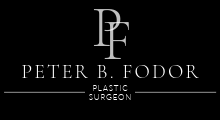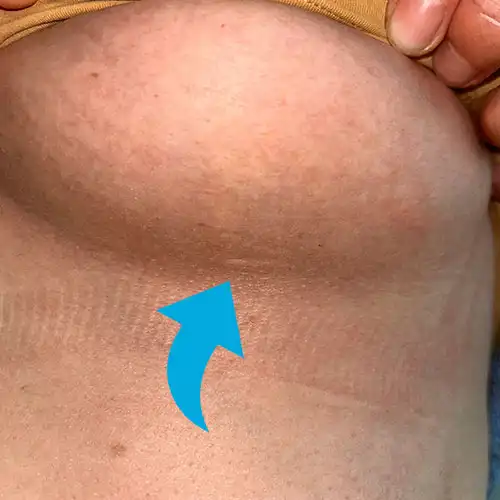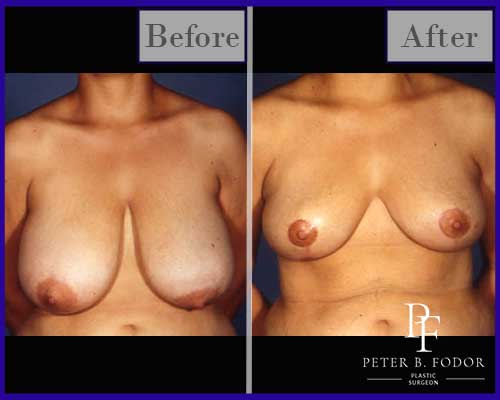Scarless Breast Reduction Los Angeles | Las Vegas
Be Your Best with Breast Reduction by Dr. Peter B. Fodor
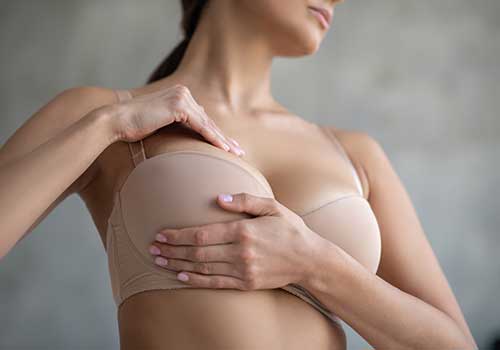
Breast Reduction Surgery Specifics
- Anesthesia
General anesthesia. Intravenous sedation with local anesthesia in some cases. On the cutting edge and preferred by Dr. Fodor is TIVA, which is a combination of the two. It diminishes bleeding and post-operative nausea. Dr. Fodor has used this method for many years.
- Length of Surgery
Usually two to hour hours.
- Scars
Depending on type of procedure performed, can range from scarless to minimal incision, or traditional incisions. Scars fade in approximately 6 months following surgery.
- Recovery
Initial mild to moderate discomfort; swelling and bruising improve in three to ten days.
Scarless Breast Reduction in Beverly Hills and Las Vegas by Board Certified Plastic Surgeon Dr. Peter B. Fodor
Breast Reduction surgery is generally recommended for women experiencing problems associated with very large and heavy breasts. Excessive breast size can be associated with a decreased sense of attractiveness and self-confidence.
Medical conditions often associated with large and heavy breasts include back and neck pain, skin irritation, skeletal deformities, shoulder indentations from bra straps, and poor posture. The goal of this surgery is to provide a woman with better shaped breasts that are proportional to the rest of her body, while improving or elimination of the health problems associated with huge and heavy breasts.
Am I a candidate for breast reduction?
Candidates for breast reduction surgery are women who are not massively overweight but who have very large, pendulous breasts that cause them physical discomfort. Breast reduction can be performed at any age, but Dr. Fodor usually recommends waiting until breast development is complete.
Although many women elect to proceed with surgery before they have had children, the results of surgery may be altered by pregnancy, weight gain, and breast feeding. Candidates who anticipate having children at some time after surgery must understand and accept that nipple sensation may change and the ability to breast feed may be impaired. However, with the most commonly performed techniques by Dr. Fodor, usually normal and reasonably normal nipple sensation and the ability to breast feed will be maintained.
Meet leading Los Angeles plastic surgeon Dr. Peter Fodor as he discusses breast reduction procedures.
Double Board Certified Plastic Surgeon
Dr. Fodor is certified by the American Board of Plastic Surgery and the American Board of Surgery.
Leading Authority in Breast Reduction Surgery
Dr. Fodor is a known as a leader in plastic surgery. He is a past president of the Lipoplasty Society of North America and a past president of the American Society for Aesthetic Plastic Surgery.
In addition to serving as a Clinical Professor of Plastic Surgery at UCLA, Dr. Fodor has been in leadership positions of numerous plastic surgery organizations including the Inernational Society of Aesthetic Plastic Surgery, the American Society for Aesthetic Plastic Surgery, and the Los Angeles Society of Plastic Surgeons.
Over 30 Years of Experience in Breast Reduction Surgery
Dr. Fodor pioneered or contributed significantly to the development of all modern liposuction techniques such as VASER, Power Assisted Suction, Superficial Liposuction, . . . These is documented in dozens of liposuction related medical articles he published in peer reviewed journals. You can access his CV on the website.
Internationally Recognized for Plastic Surgery Expertise
Widely recognized by the national and international Plastic Surgery community as a Lipoplasty educator through his contributions at medical conferences and live surgical demonstrations.
Featuring Scarless Breast Reduction & Lift with Liposuction-Only-Breast-Reduction (LOBR) – Los Angeles & Las Vegas
A highly specialized breast reduction method utilizing a combination of advanced liposuction techniques. This results in addition to breast reduction in enhanced skin shrinkage, and therefore a breast lift effect with no visible scarring. It is also miraculously effective in breast asymmetry and treatment of gynecomastia.
Scarless breast reduction is not simply liposuction of the breast. We use a combination of special techniques of liposuction that result in skin shrinkage and therefore not only the breast is reduced but we also get a lifting effect.
Before & After
Liposuction Only Breast Reduction & Lift
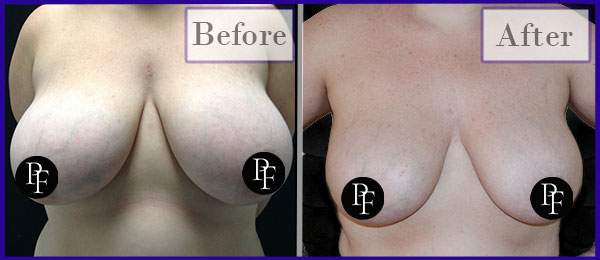
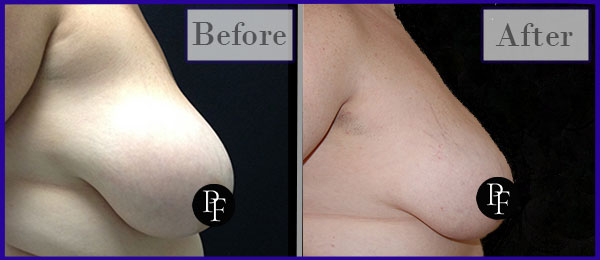
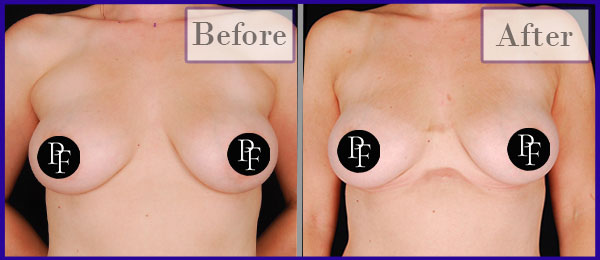
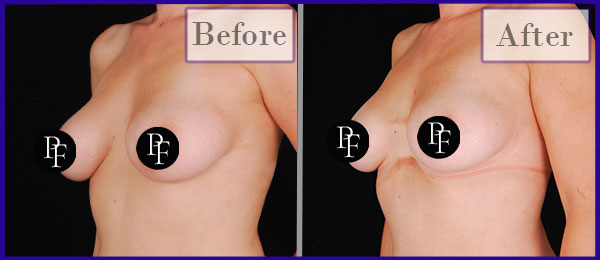
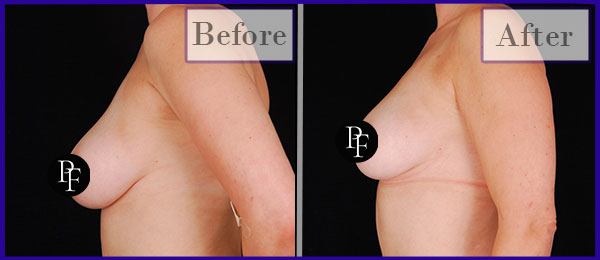
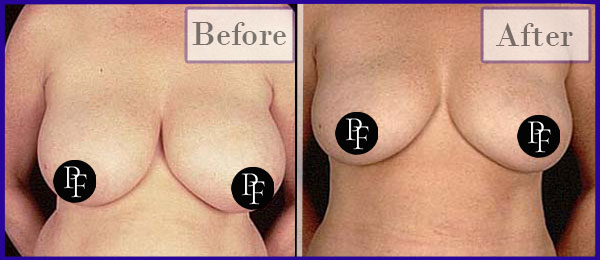
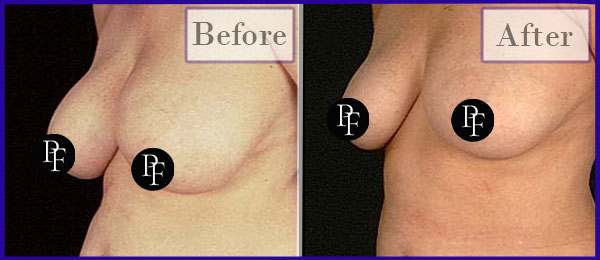
Benefits of Scarless Breast Reduction with LOBR
No Visible Scars
Liposuction only breast reduction requires in most cases only one 3 mm in length practically invisible scar well hidden in the fold under the breast.
Scarless Lift Effect
Dr. Fodor’s specialized form of liposuction enables shrinkage of the skin from the periphery to the nipple that results in a permanent lift effect.
Reduced Complications
No complications have been seen in Dr. Fodor‘s practice.
Faster Recovery
Minimal, if any pain, discomfort some temporary bruising and swelling.
Scarless Breast Reduction
“The most minimally invasive, and in my opinion still highly underutilized, technique is lipoplasty-only breast reduction (LOBR). Rapid recovery, virtually undetectable scars, and no sensory changes or loss of ability to breast feed are some of the major advantages. Though not all women seeking breast reduction are good candidates for LOBR, I believe this approach could be selected for many more patients. In women for whom nipple/areola position is not sufficiently improved through LOBR, a lift procedure of a lesser magnitude then previously would have been necessary can be carried out at a later time. LOBR also serves well for the older patient group, many of whom for health or other reasons prefer to have a smaller operation, even with the trade-off of some residual droopiness.” – Dr. Peter B. Fodor
Benefits of Scarless Breast Reduction
- No Visible Scars – Liposuction only breast reduction requires significantly less surgical incisions than a traditional breast reduction. 3mm incisions are hidden in the fold below the breast.
- Faster Recovery Time – Less incisions means less downtime and a faster return to normal activities.
- Reduced Risk of Complications – liposuction only breast reduction technique has been associated with a lower risk of complications such as lower risk of infection, bleeding, and anesthesia related complications.
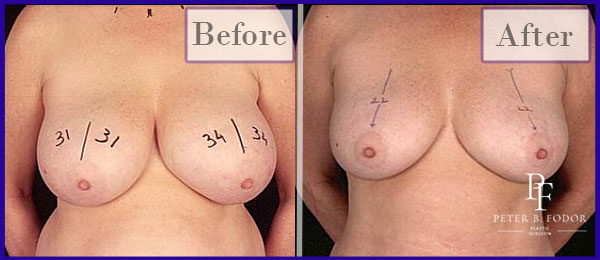
Liposuction Only Breast Reduction (LOBR) Case Study
Patient presented for scarless breast reduction. Her results were remarkable at two months after surgery and photos show lasting results at one year after.
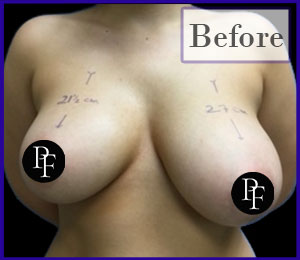
Pre-Operative
Photo shows patient before Liposuction Only Breast Reduction and Asymmetry correction.
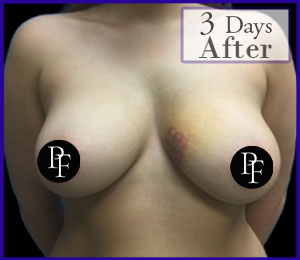
3 Days Post-Operative
Photo shows patient only three days following procedure with little brusing. Breasts are smaller but not perfectly symmetric yet.
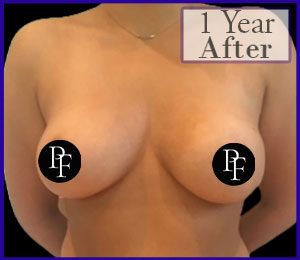
1 Year Post-Operative
Photo shows patient one year following procedure. Results show the lifting effect from the specialized liposuction technique.
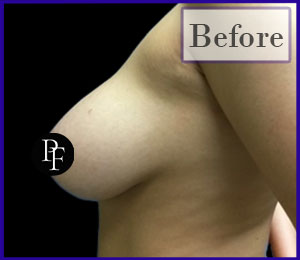
Pre-Operative
Photo shows patient before Liposuction Only Breast Reduction.
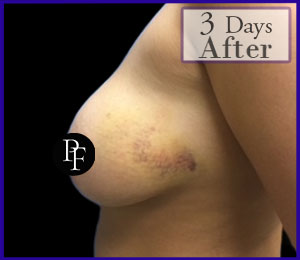
3 Days Post-Operative
Photo shows patient only three days following procedure with little bruising. Breasts are already appearing smaller.
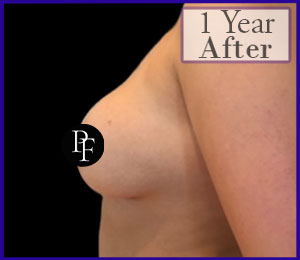
1 Year Post-Operative
Photo shows patient one year following procedure.
Types of Breast Reduction
Various techniques are available to reduce breast size. Most women want breasts that are well shaped and symmetrical, even if it means that incisions must be placed to achieve the desired result. Since all patients present with different situations and cosmetic goals, there are different options available to help reduce breast size.
- Traditional Breast Reduction – The most common surgery involves the inverted T incision, also known as the anchor incision. This is the most common method to reduce breast volume and enhance shape. This method involves an incision around the areola, a vertical incision extending from the areola to the breast crease, and another incision expanding the length of the breast crease. The resulting incisions resemble a “keyhole” appearance until sewn together after excess fat, glandular tissue, and skin are removed. The nipple remains attached to its blood supply and is elevated into the “keyhole” area to lift into a more attractive position.
- Limited Incision Breast Reduction – Limited incision techniques may involve an incision around the areola (Periareolar technique), eliminating both the vertical and horizontal incision; or around the areola and vertically down the lower portion of the breast (vertical technique), eliminating the horizontal incision in the breast crease.
- Liposuction Only Breast Reduction – For carefully selected patients, liposuction of the breast may be effective (lipoplasty-only breast reduction, or LOBR), leaving only very small and barely detectable scar. This scarless procedure is further detailed below.
Breast Reduction Scars
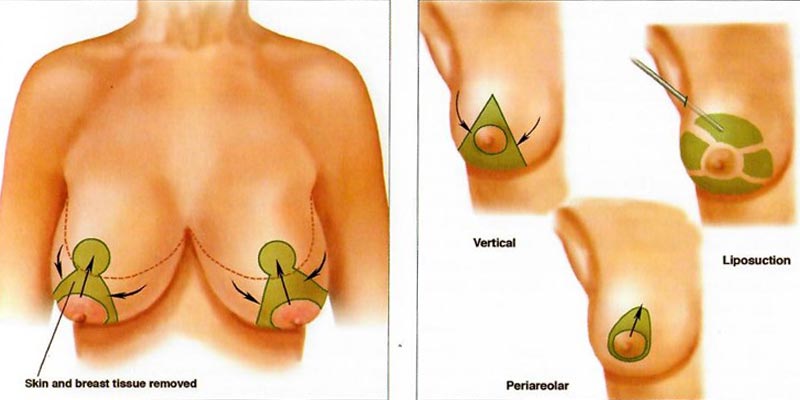
The “inverted T” incision, also called the “anchor” or “keyhole” incision, remains one of the most commonly used surgical techniques to reduce breast volume and enhance shape. Incisions are made around the areola, vertically down the lower portion of the breast and horizontally along the crease underneath the breast. Excess fat, glandular tissue, and skin are removed, and the nipple, still attached to its blood supply is elevated in the “keyhole.”
Limited incision techniques may involve an incision just around the areola (periareola technique), eliminating both the vertical and horizontal incision; or around the areola and vertically down the lower portion of the breast (vertical technique), eliminating the horizontal incision in the breast crease.
Alternatively, for carefully selected patients, liposuction of the breast may be effective (scarless or lipoplasty only breast reduction), leaving only very small and barely detectable scars.
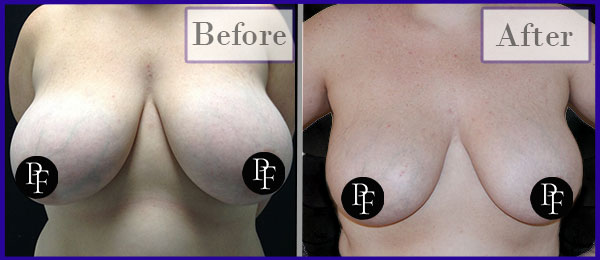
Liposuction Only Breast Reduction
The most minimally invasion technique is lipoplasty-only breast reduction (LOBR). Rapid recovery, virtually undetectable scars, and no sensory changes or loss of ability to breast feed are some of the major advantages. Though not all women are good candidates for LOBR, this approach could be selected for many more patients.
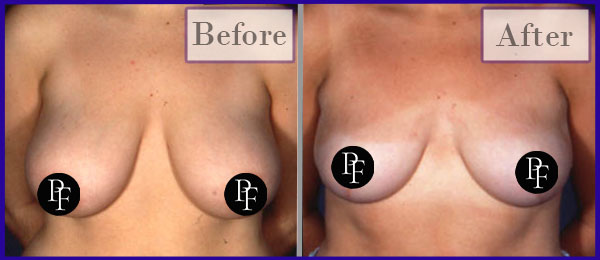
Minimum Incision Breast Reduction
In women whom nipple/areola position is not sufficiently improved through liposuction-only breast reduction, a lift procedure of a lesser magnitude then previously would have been necessary can be carried out at a later time or in conjunction with liposuction.

Traditional Breast Reduction
The most common breast reducing surgery involves incisions on the breast. These incisions may involve an incision around the areola, a vertical incision extending from the areola to the breast crease, and an incision expanding the length of the breast crease.
Breast Reduction Consultation
Dr. Peter Fodor is available for breast reduction consultations at both of this plastic surgery locations in Los Angeles & Las Vegas. During your consultation with Dr. Fodor, he will examine your breasts and evaluate variables that may affect the procedure, such as your age, skin condition, size of your breasts, and the shape of your breasts. Photographs may be taken for your medical records. Dr. Fodor will discuss the options available to you and, considering your needs and goals, help you make the best decision.
During this consultation, Dr. Fodor will need to review your entire medical history, including any medications you may be currently taking, whether you suffer from allergies or medical conditions, and if you have had any prior surgeries.
Preparing for Breast Reduction Surgery
Dr. Fodor and his staff will give you instructions about how to prepare for your surgery. Please note that smoking and nicotine use can have a profoundly negative effect on blood flow and therefore healing.
Dr. Fodor will also give you guidelines on eating, drinking and medications, such as avoiding aspirin or anti-inflammatory medications that promote bleeding.
Breast reducing surgery will not increase your risk of developing breast cancer. However, depending on your age and other factors, Dr. Fodor will recommend a mammogram before surgery.
Breast surgery is performed in an outpatient facility. You should arrange to have someone drive you to and from surgery and to stay will you for a day or two after surgery.
Breast Reduction Recovery
Surgery to reduce breast size is performed under general anesthesia, and you will sleep throughout the entire procedure. Following surgery, your breasts will be covered with gauze dressings, and you will be placed in a compression garment. The garment is vital to controlling bleeding and swelling following surgery. Do not remove this garment until Dr. Fodor instructs you to.
Although you may be encouraged to spend short periods of time out of bed the day after surgery and will be able to move around more freely within several days, you must avoid any straining, bending, or lifting that might increase swelling or cause bleeding.
- Pain – You will probably feel some pain for the first few days, particularly will you move around or if you cough. Some discomfort will persist for a week or more, and Dr. Fodor will prescribe medication to help control the pain.
- Scars – Incision sites will remain reddish or pink in color for several months. Although many patients find that their scars fade and eventually become only thin white lines, other patients do not heal as well, and their scars may become wide and raised. How your scars will finally appear cannot be predicted before surgery. Therefore, it is important to protect your incisions from any sun exposure for one year following surgery. Dr. Fodor will be following your healing and directing you as to the care of your incisions to help them heal well.
- Nipple Sensation – You will likely notice a loss of sensation in your nipples and areola areas. This numbness is usually temporary. However, it may take several weeks, months, or a full year until feeling returns to normal. Permanent loss of sensation can occur, but with most reduction techniques the incidence is low.
Breast Reduction Cost
Because breast reduction is usually performed to relieve physical symptoms, it is covered by very few insurance plans. Insurance companies require trying other remedies, including diet and exercise, medical treatment for rashes, before approving this surgery.
However, the breast weight volume removed during surgery may not qualify for coverage leaving the final bill to be covered by the patient. Additionally, health insurance does not cover to reduce breast size with liposuction alone.
For this reason, Dr. Fodor is not in-network with any health insurance company and does not accept insurance for this procedure. Dr. Fodor’s staff will be able to provide with you a written quote for your procedure recommended by Dr. Fodor upon your consultation.
Breast Reduction Frequently Asked
Questions
Do Reduction & Lift Results Last?
To our best estimation results last forever. We have patients return to us for unrelated procedures years after their LOBR demonstrating that results are long lasting.
Do I Need a Mammogram or Any Younger Patients Breast Ultrasound Examination?
Your consultation and potential scheduling for surgery is greatly expedited by providing this. Dr. Fodor needs to personally evaluate the study to confirm your candidacy for the procedure.
What is the Surgical Fee for LOBR?
It ranges between $5,000 and $15,000.
Insurance companies seldom cover anymore costs even for traditional breast reduction. They consider LOBR liposuction, aesthetic, and therefore do not cover it.
What is Liposuction-Only-Breast-Reduction Recovery?
Very mild if any initial discomfort. Minimal bruising and swelling which dissipate by 7 to 10 days.
What Kind of Anesthesia is Used for Liposuction-Only-Breast-Reduction?
General anesthesia just with a mask (LMA) or intravenous sedation and local. On the cutting edge and preferred by Dr. Fodor is TIVA, which is a combination of the two. It diminishes bleeding and post-operative nausea. Dr Fodor has many years of experience with this modality.
For Out of Town Patients: How Long Before I Can Return Home?
We recommend you to stay in town for 3-5 days after surgery.
